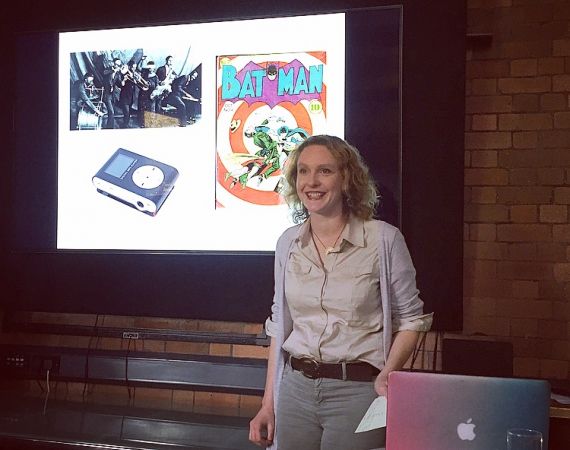Lunchtime talk write-up
Posted on Tue 25 Oct 2016
“With great opportunity comes great responsibility”: Building an ethical framework for Virtual Reality documentary
In this talk, Catherine Allen invited us to consider the hard questions that VR producers face.

Catherine Allen is an ambitious Virtual Reality (VR) and Immersive Media creator and consultant. She produced one of the BBC's first VR documentaries Easter Rising: Voice of a Rebel and more recently the BBC Talkshow No Small Talk 360. With her wealth of experience, and as an advocate of women's role in the VR industry, she was invited to write a piece on ethics for an academic journal. In this talk, she invited us to consider the hard questions that VR producers face. Here are some interesting points I picked up:
With great power comes great responsibility
How can you manage the duality of occupying two spaces simultaneously? There is a great mental and physical transition that users go through to submit to a VR experience. Studies have shown that participating in something that warps your sense of reality engages the parts of your brain where memories are created. In this vulnerable and meldable state, their senses stripped and physical space compromised, imagine how dangerous the technology could be in the wrong hands! Catherine calls for the creation of work that is good for society rather than harnessed for corporate gain or even something more sinister. A case Catherine recalled was a work in which the audience are made to believe they are perched on a high ledge above a landscape. The reactions of many in a headset was of fear of falling to their death, such was the realistic nature of the piece.
What's VR got to do with chickens?
Catherine recounted an analogy that implicated VR as an 'empathy machine'. Imagine if you thought you might want to keep chickens, but weren't sure where to start learning how. You ask a colleague who keeps chickens who presents you with two choices. They can tell you all about it, or you can go down to the coop with them and get first hand experience of mucking out and feeding the chickens. You choose the latter and when you arrive you discover there has been a problem with a fox intrusion. Your colleague goes and gets their gun to shoot the culprit. You empathise with their reasoning, but when you go to do it yourself, it's different and you can't bring yourself to do it. You feel complicit. There is an intrinsic ethical difference between hearing about someone doing something, and doing it yourself. VR is a simulation of doing something. What are the ethical challenges that come with the notion of simulating doing?
Questions every VR maker should ask themselves
Like many media producers, having a sense of care to their audience is imperitive. With VR that care extends as the audience are so much more involved in the sensation. Should a user have PTSD, could an element of the experience trigger them? How would your VR piece suit someone who was bound to a wheelchair and unable to move as freely, or if the individual has hearing impairments that stripped an integral sense used for safety in that space. Can you count on there being no long term affects of the experience? Just like theme parks, should you instate restrictions for users safety and wellbeing? Can you create variants of the original to appeal to different audiences? Passive consumers hold makers to account, so it is every producer's prerogative to ensure every angle has been explored and every question that needs to be asked, answered. Careful and early planning is essential to overall success. And in a new industry that is still finding its feet - it will be what you make it.
The moral panic of new technology
Just like MP3 technology, comics and jazz music, there will be a critical point of panic when VR breaks into the mainstream. VR makers need to be prepared for the questions they will be asked in this eventuality, with evidence and documentation to prove the integrity of their work. In time, regulation and legislation will be in place, but it will require the concerns of the public to better address and inform the writing of these.
Regardless what your thoughts are on VR, let's be glad that responsible producers like Catherine are asking all the right questions to ensure the longevity of a fast-rising piece of technology.